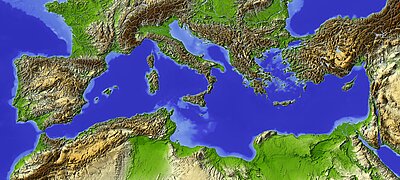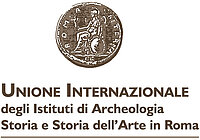Post-nationalisme, Citoyenneté et Migrations en Méditerranée
École française de Rome
The 04/22/2016
Post-nationalisme, Citoyenneté et Migrations en Méditerranée
Au milieu des années 1990, l’idée d’une entrée dans une ère « post-nationaliste » a commencé à émerger au sein de la communauté des chercheurs. Depuis cette période, des débats extrêmement nombreux et féconds, accompagnés d’études empiriques particulièrement détaillées, ont vu le jour pour tenter d’étayer cette hypothèse. Les travaux ont notamment porté sur le phénomène migratoire, considéré comme le symptôme d’une citoyenneté post-nationale qui viendrait remettre en cause le modèle libéral traditionnel. Malgré l’intérêt de ces discussions, tout le monde s’accordera aujourd’hui à dire qu’elles ont été marquées par une vision très enchantée de la citoyenneté et de l’avenir des droits de l’Homme. L'intérêt politique pour les questions liées à la citoyenneté post-nationale n'a ainsi jamais été aussi vif, mais il a pris une tournure nouvelle, plus grave au fur et à mesure que les vagues de migrants se succédaient les unes aux autres. Dans la région méditerranéenne notamment, qui est perçue par beaucoup comme « envahie » par les réfugiés et les migrants, les analyses académiques les plus récentes sont empreintes de plus de pessimisme et traduisent une certaine préoccupation à l’égard de la conception libérale de la citoyenneté.
Cette conférence entend précisément contribuer à ces enjeux en constituant un lieu d’échanges et de dialogues consacré aux thèmes du post-nationalisme, de la citoyenneté et des migrations dans la région méditerranéenne. Sur le plan normatif, l’une des défis à relever est d’échapper à une vision dichotomique et même antagonique de la situation, qui voudrait faire croire que les intérêts des deux rives de la Méditerranée sont inconciliables. Faisant fi d’une longue tradition d'études pan-méditerranéenne, une telle lecture repose sur des présupposés biaisés, fondés sur l’opposition systématique du Nord au Sud, des riches aux pauvres, des Chrétiens aux Musulmans, des démocrates à ceux qui ne le seraient pas, etc. En définitive, nous voulons discuter de la citoyenneté en Méditerranée sous tous ses aspects, de façon éclairée et pluraliste, en faisant valoir que les approches post-nationalistes peuvent encore avoir beaucoup à dire et à apporter, tant qu'elles ne prétendent pas être la solution à tous les problèmes et qu’elles n’ont pas l’ambition d’imposer des normes supposées supérieures à des communautés nationales constituées.
Postnationalism, Citizenship and Migration in the Mediterranean area
In the mid-1990s an argument emerged among some scholars that an era of “postnationalism” was changing the way citizenship was being constructed. Since then, not only did an enormous discussion ensue, but detailed and extensive empirical studies emerged to test the postnational argument. In particular, these studies have focused their main attention on the role of migration as key factor challenging the traditional type of liberal citizenship, and hence, driving the emergence of a postnational citizenship. Yet, probably everybody will agree, in 2016 and on all sides of the debate, that the postnational projections gave a rather optimistic cast to the future of citizenship and human rights. The political interest in migration and postnational citizenship has never stopped expanding over time, but it has gradually taken a new twist with successive increases of migration. In the Mediterranean area in particular, which is by now an area perceived to be ‘flooded’ by refugees and migrants, the pendulum has swung the other way driven, by concerns over the future of liberal values. Postnationalism also takes on a potentially less welcome cast—for example, in postnational crime.
This conference provides new, updated discussions over the themes of postnationalism, citizenship and migration in the Mediterranean area. The real challenge that this conference wants to bring to postnationalism is, however, of a more normative character, dealing in particular with the deeply antagonistic bias that considers the interest of one side of the Mediterranean to be in conflict with the other. Against a longstanding tradition of historical pan-Mediterranean studies, this normative antagonistic bias goes so as far as to imagine that the two Mediterranean shores bifurcated in terms of North vs the South, rich vs. the poor, Christian vs. Muslim, democratic vs non-democratic, and so forth, all grounded in a not-so-hidden idea of good vs. bad. Ultimately we want to approach the developments of citizenship in the Mediterranean area from a variety of perspectives, arguing that postnationalism can still have much to say, as long as it is not imagined (regressively) as an opposition between an enlightened shore against the other, or (progressively) as the importing of postnational rights solely within self-contained national communities. Indeed, the Mediterranean area itself may be becoming the locus of a new normative framework.
Programme
9h10 -9h30 :
Salutations : Catherine Virlouvet, directrice de l’Ecole française de Rome ; Fabrice Jesné, directeur des études pour les époques moderne et contemporaine à l’Ecole française de Rome
9h30-10h40 :
Panel I - La citoyenneté en Méditerranée : une perspective diachronique
Président : Rinna Kullaa
1) Manlio Cinalli et Carlo Nuzzo : Citizenship in France and Italy : The longstanding dialectics between Polis and Civitas
2) Sinem Adar : Precarious Citizenship on the Southern Side of the Mediterranean : Common dynamics and distinctions in terms of religion and nation-building in Turkey and Egypt
Discutant : Fabrice Jesné
10h40-11h00 : Pause
11h00-12h30 :
Panel II - De futurs citoyens ? Les migrations en Méditerranée
Président : Angelo Scotto
3) Elena Ambrosetti et Cristina Giudici : Citizens of the Mediterranean Area : characteristics, movements, dynamics
4) Maria Paola Nanni : Il panorama dell’immigrazione in Italia
5) Marta Capesciotti : La disciplina della cittadinanza nell'ordinamento giuridico italiano : la legislazione in materia ed il dibattito attuale
Discutant : Chiara Facello
12h30-14h00 : Pause déjeuner
14h00-15h10 :
Panel III - La Méditerranée comme laboratoire post-national
Président : Niccolò Mignemi
6) Maurizio Ambrosini : Migration and the Labour market in the Mediterranean area: Why is it so difficult to eradicate irregular migration?
7) David Jacobson et Natalie Deckard : Postnationalism and Gender: Women’s Status after Emigration in Mediterranean Muslim Communities
Discutant : Rinna Kullaa
15h10-16h00 : Conclusions
Discutants : Manlio Cinalli et Olivier Tourny
Télécharger le programme en pdf




